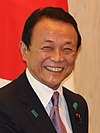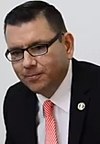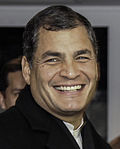Mariranan presidential election, 2017-18
| |||||||||||||||||||
| |||||||||||||||||||
File:Marirana map counties round 2.png | |||||||||||||||||||
| |||||||||||||||||||
Marirana held the its 51st presidential election in two rounds - the first on the 30th December 2017 and the second on the 14th January 2018 to elect the 25th President of Marirana. As no candidate won the necessary 50% of the vote in the first round the two most voted candidates - Lorenzo Occhetto of the Democratic Party of Socialists (who got 44.1% of the vote) and Alfonso Hatoyama of the United National Party (Who got 18.5% of the vote) advanced to the second, which saw Occhetto elected president with 59.3% of the vote.
Widely perceived as an realigning election, it was the first election since the restoration of democracy since 1986 that a candidate from the Coalition for Democratic Action did not enter the second round, with the CPLD candidate Rosa Michelozzi scoring a historic low of 16.5% of the vote and the first free election since 1905 that a candidate of the Anti-Revolutionary or Radical Liberal parties did not win the presidency. It was the first ever election in Mariranan history that a left-wing candidate won power.
Electoral process
Since the 1994 presidential election presidents in Mariranan are elected in a two-round system in which if a candidate does not achieve 50%+ of the vote in the first round the candidates with the two highest percentage of the vote will enter a second round. President's can serve a maximum of a single five year term, meaning incumbent president Giorgio Macciocchi is not eligible for re-election. Voting in Marirana is compulsory for all literate people's aged 18-75 with strict penalties for those who do not - however the existence of cartel groups in large swathes of the country typically results in turnout to be closer to 80%.
To registrar to become a candidate one has to be a Mariranan citizen, have had permanent residency in Marirana in the past five years, be over the age of 45 and either has collected 50,000 voters' signatures or be the official candidate of a political party with 3% representation in either the House of Senators or House of Councillors. People with dual citizenship are banned from running for public office.
Background
Since the return of democracy in 1987, Marirana has been ruled by the Coalition for Democratic Action (CPLD), a political alliance between the centre-right Anti-Revolutionary Party and centrist Radical Liberal Party. The last presidential election held between 2012-13 saw the CPLD candidate president Giorgio Macciocchi of the Anti-Revolutionary Party beat Lorenzo Occhetto of the Democratic Party of Socialists in a runoff vote with Macciocchi getting 50.6%% of the vote to Occhetto's 49.4%.
Macciocchi's term was marred by several political and economic crises that severely undermined the stability and legitimacy of the Mariranan state. In June 2007 under previous president Roberto Vernizzi, Marirana had undergone a currency crisis which combined with external economic shocks, as well as a dependency on volatile short-term capital and debt to maintain the overvalued fixed exchange rate caused the economy to collapse resulting in Marirana to enter the worst recession in 100 years, with income poverty rising to 62.32%. The government responded to the crisis through austerity policies applying for an ERP from GIFA. In August 2009 the government announced it would devalue the lira which led to several firms to declare bankruptcy and inflation to increase. Despite the economy recording weak growth from 2010 onwards poverty is still high as is debt.
The economic collapse in 2007 led to a rise in social discontent with their protests and actions against the government. The 2016 decision to devalue led to protests and riots that led to the Mariranan insurgency to escalate. This led to massive destabilisation in the Ritaldi, Mederio and Umbertide provinces as drug cartels and insurgent groups increased their operations, leading to the Mariranan government to approve of an intervention by the JDF in 2016. The approval of JDF intervention was approved by the Presidency and the Cabinet without a vote in parliament, a move technically within the limits of the constitution but considered to be highly controversial.
The government saw its popularity further drop following the 2016 Mariranan earthquake. Whilst numerous international organisations opted to send aid to Marirana it emerged in August 2017 following an investigation by PDS leader Lorenzo Occhetto that the government had embezzled a significant amount of aid intended for earthquake relief, with some of that money being redirected to death squads. The potential of President Macciocchi having full knowledge of and approving of the illegal redirection of aid led to many to accuse Macciocchi of violating the constitution that explicitly forbids the president from "unlawful acts". A vote to impeach Macciocchi took place on the 21st October - whilst a majority of the House of Councillors voted to impeach Macciocchi the 120 votes in favour of impeachment did not reach the two-thirds qualified majority to go through with impeachment. This led to 22 CPLD rebels to split from the PAR and PLR and form a new party, the Union of Centrists and Democrats.
Candidates
The deadline for candidates to apply for the ballot paper ended on the 26th November. Six candidates - Rosa Michelozzi, Lorenzo Occhetto, Alfonso Hatoyama, Paolo Dallavalle, Dario Lorenzin and Ettore Zanetti - either got the backing of 4% of MP's in the Parliamentary Assembly or got the necessary 50,000 voter signatures to apply for a candidacy.
| Candidate name and age political party |
Slogan | Political office(s) | Details | ||
|---|---|---|---|---|---|
| Rosa Michelozzi (48) Anti-Revolutionary Party (Coalition for Democratic Action) |

|
Uniti per il Bene Comune United for the common good |
Prime Minister of Marirana (2012-2017) Leader of Anti-Revolutionary Party (since 2012) |
The daughter of former president Oliviero Michelozzi, Rosa Michelozzi is the current Prime Minister of Marirana. Michelozzi's programme promotes centre-right policies such as continuing supporting Asterian involvement in the Mariranan insurgency, supporting economic reform to deal with Marirana's debt and sponsoring poverty reduction programmes. | |
| Lorenzo Occhetto (52) Democratic Party of Socialists (Avanti Marirana!) |

|
Avanti Marirana Forward Marirana |
Senator for Mederio (since 2010) Chairman of the Democratic Party of Socialists (since 2013) |
Occhetto led the investigation into the earthquake embezzlement scandal and has since risen in the polls. Occhetto supports a "social revolution" promoting poverty reduction schemes, restructure Marirana's debt, tackle government corruption, reorient Marirana away from Asteria to promote south-south cooperation and set up a sustainable peace process whilst opposing drug proliferation. Occhetto's platform is considered left-wing populist. | |
| Alfonso Hatoyama (76) United National Party (Forza Populare 2018) |

|
Servire la nazione Serving the nation |
President of Marirana (2003-2006) Chairman of the United National Party (since 2008) |
Former president of Marirana from 2003-2006 Hatoyaama is considered to have taken a right-wing populist approach. Hatoyama proposes wholesale economic liberalisation and privatisation, increased participation of Asterian troops to "crush" the Mariranan insurgency and enforce military rule in regions that are "ungovernable" stating authoritarian solutions are necessary for peace. | |
| Paolo Dallavalle (45) Union of Centrists and Democrats |

|
Cambiare in cui Credere Change to believe in |
Member of the House of Councillors (since 2010) |
Dallavalle originally ran for the CPLD nomination - however following an impeachment vote against Giorgio Macciocchi Dallavalle and other CPLD MP's who voted for the impeachment split from the CPLD and formed the Union of Centrists and Democrats, with Dallavalle being appointed the UdCdD's candidate. Dallavalle is promoting working with the JDF to combat the insurgency, supporting neoliberal economic reform and fighting corruption. | |
| Dario Lorenzin (64) Positive Marirana |

|
Saluta la vita Say hello to life |
President of Marirana (2008-2013) |
The founder of the Positive Marirana party, Lorenzin is running for the second time for the presidency. Lorenzin supports strong institutional reforms to deal with corruption and supporting social liberalism. In terms of the insurgency Lorenzin promotes negotiating with certain insurgent groups whilst cracking down on drug cartels. | |
| Ettore Zanetti (50) Liberty and Justice Party |

|
Tutto per l'Marirano All for Marirana |
Councillor for Ritaldi (2002-2012) |
Running in his second presidential campaign, Zanetti is the leader of the far-right Liberty and Justice Party (PdLdG). Zanetti supports the "destruction of the financial clique" to end the recession, as well as executing insurgents and rejecting "Asterian-banker hegemony" across the continent. | |
Primaries
Coalition for Democratic Action
The Coalition for Democratic Action (a political alliance between the Anti-Revolutionary Party and Radical Liberal Party) holds a closed primary in all six provinces. The candidate of the CPLD is picked via a electoral college with the candidate winning the most delegates becoming the CPLD's candidate for President.
The deadline of the CPLD's candidate application was the 1st November. This will be the first CPLD primary where a member of the Social Democrats will not participate as PAR leader Amintore Salvadori announced his retirement from politics. The frontrunner of the race was the centre-right Rose Michelozzi with her only competition, Paolo Dallavalle, seen as a outsider from the CPLD elite supporting economic liberalism. However, on the 21st November Dallavalle split from the CPLD to form the Union of Centrists and Democrats meaning Michelozzi automatically became the CPLD's candidate.
Democratic Party of Socialists
| ||||||||||||||
| ||||||||||||||
The Democratic Party of Socialists have announced like in the 2013-14 election that they will hold an "open primary of the left", allowing members of other leftist parties (including the PDS, Union of Green Democrats - Ecological Action and Party of Social Justice) to run with members of the public allowed to vote as long as they pay a 4 lira fee.
The deadline for candidate nominations was the 15th October. Two candidates - Lorenzo Occhetto and Natalia Trapattoni - successfully submitted candidate application. Despite intense speculation Elisabetta Moro, the Governor of the San Marco province, declined to contest the nomination instead endorsing Occhetto.
Within the field, Occhetto is considered to be the clear front-runner presenting a left-wing populist program of fighting corruption and reducing poverty compared to Trapattoni whose is seen as more centrist.
The primary held on the 25th November. Occhetto won the primary in the first round with 76.5% of the vote with Trapattoni getting 23.5%. On the 1st December the PDS, UDV-AE and PGS agreed to contest the election under an electoral alliance, Avanti Marirana! (Forward Marirana)
United National Party
The PNU does not utilise a primary system to nominate its candidate for president, with the party's 17 member Federal Executive instead voting on a candidate. The PNU's nomination for candidates closed on the 17th November with only two candidates - former President Alfonso Hatoyama and Senator Mario Castaldo - submitting application forms for the PNU's nomination.
Castaldo is considered a member of the PNU's reformist wing emphasising economic reform and the rule of law whilst Hatoyama is seen as a "hardliner" who supports more authoritarian solutions to deal with the Mariranan insurgency. Hatoyama had been banned from holding public office for 8 years following corruption allegations in 2008, resulting in this being the first national election since 2003 that Hatoyama was permitted to file an application to the electoral commission. On the 23rd November Hatoyama was unanimously nominated by the Federal Executive.
Other parties
Three other candidates collected the necessary signatures to launch a run for president - leader of the Union of Centrists and Democrats Paolo Dallavalle, Mayor of Santa Maria and leader of the Positive Marirana party Dario Lorenzin and former Ritaldi Councillor Ettore Zanetti. Dallavalle is running on a economic liberal centrist policy, Lorenzin is considered to be a anti-clerical social liberal and Zanetti is seen as running on a neo-functionalist programme.
Opinion polls
First round
| Date | Institute | Rosa Michelozzi |
Lorenzo Occhetto |
Alfonso Hatoyama |
Paolo Dallavalle |
Dario Lorenzin |
Ettore Zanetti |
Other or no answer |
Lead |
|---|---|---|---|---|---|---|---|---|---|
| End of public opinion polling (25/12/2017) | |||||||||
| 23/12/2017 | IEN | 22% | 41% | 18% | 10% | 4% | 4% | 1% | 19% |
| 21/12/2017 | Opinione Pubblica | 20% | 40% | 19% | 12% | 3% | 5% | 1% | 20% |
| 19/12/2017 | QN Votazione | 21% | 42% | 18% | 11% | 3% | 4% | 1% | 21% |
| 17/12/2017 | Opinione Pubblica | 20% | 39% | 20% | 12% | 4% | 5% | 1% | 19% |
| 15/12/2017 | IEN | 22% | 37% | 19% | 9% | 5% | 6% | 2% | 15% |
| 13/12/2017 | Opinione Pubblica | 24% | 38% | 20% | 8% | 5% | 3% | 2% | 14% |
| 11/12/2017 | QN Votazione | 27% | 36% | 18% | 8% | 5% | 4% | 2% | 9% |
| 09/12/2017 | Voce Politica | 29% | 36% | 16% | 6% | 5% | 5% | 3% | 7% |
| 07/12/2017 | Opinione Pubblica | 28% | 35% | 17% | 7% | 4% | 5% | 4% | 7% |
| 05/12/2017 | Opinione Pubblica | 31% | 36% | 15% | 6% | 4% | 4% | 4% | 5% |
| 03/12/2017 | QN Votazione | 35% | 32% | 15% | 5% | 4% | 3% | 6% | 3% |
| 01/12/2017 | Opinione Pubblica | 33% | 34% | 14% | 5% | 5% | 2% | 7% | 1% |
| 30/11/2017 | IEN | 34% | 35% | 13% | 4% | 5% | 3% | 6% | 1% |
| 28/11/2017 | Voce Politica | 34% | 32% | 15% | 5% | 4% | 3% | 7% | 2% |
| 26/11/2017 | IEN | 33% | 35% | 14% | 4% | 5% | 2% | 7% | 2% |
| 24/11/2017 | IEN | 31% | 34% | 14% | 5% | 5% | 3% | 8% | 3% |
Second round
| Date | Institute | Lorenzo Occhetto |
Alfonso Hatoyama |
Lead |
|---|---|---|---|---|
| 13/01/2018 | Voce Politica | 58% | 42% | 16% |
| 12/01/2018 | IEN | 56% | 44% | 12% |
| 11/01/2018 | Opinione Pubblica | 58% | 42% | 16% |
| 10/01/2018 | QN Votazione | 59% | 41% | 18% |
| 09/01/2018 | IEN | 62% | 38% | 24% |
| 08/01/2018 | Opinione Pubblica | 57% | 43% | 14% |
| 07/01/2018 | Opinione Pubblica | 55% | 45% | 10% |
| 06/01/2018 | Voce Politica | 52% | 48% | 4% |
| 05/01/2018 | Opinione Pubblica | 49% | 51% | 2% |
| 04/01/2018 | QN Votazione | 46% | 54% | 8% |
| 03/01/2018 | IEN | 49% | 51% | 2% |
| 02/01/2018 | IEN | 53% | 47% | 6% |
| 01/01/2018 | Opinione Pubblica | 58% | 42% | 16% |
| 31/12/2017 | IEN | 60% | 40% | 20% |
Campaign

The campaign proper for the election began following the final nomination of candidates on the 26th November. At the start of the campaign Lorenzo Occhetto, the candidate of the Democratic Party of Socialists, led in the polls averaging 34-35% albeit at a very thin margin with Rosa Michelozzi, the candidate of the Coalition for Democratic Action averaging 33-34%. The other candidates ranged from 3-15% in the polls.
Initially the campaign focused on corruption due to the recent failed impeachment of President Macciocchi; this was seen to benefit Occhetto and hurt PNU candidate Hatoyama due to his association with corruption from his prior presidency. As well as this the political machine of the CPLD ensured that Michelozzi had strong momentum going into the campaign. Michelozzi's campaign consisted of a mix of rallies and TV advertisements with the majority of her speeches and rallies based around praising the achievements of CPLD rule and warning of the dangers of an Occhetto presidency. On the 1st December several left-wing parties formally backed Occhetto creating an electoral alliance known as Avanti Marirana!. Occhetto primarily used rallies to promote his policies, criticising the incumbent government for corruption, fiscal mismanagement, rising poverty and worsening security.
On the 6th December the Ospeletto Cartel carried out a bombing at the St Paolo school in Ospeletto that killed 112 people, the majority of whom were children. The attack caused the campaign to shift to security issues, with Occhetto stating "all of Marirana stands in solidarity with St Paolo Secondary School after this heartbreaking loss of life - we have to both bring the murders to justice so we can work towards peace whilst Alfonso Hatoyama stated that the perpetrators of the attack were "scum who should be shot". The attack saw poll numbers for Michelozzi collapse as Hatoyama's and Paolo Dallavalle's increased.
A debate before the first round was held on the 23rd December, in which candidates clashed over security and economic policy. The day before Senouillac policy makers had indicated they would be willing to assist in anti-drug trafficking operations in Marirana - whilst the declaration was condemned by Michelozzi and Hatoyama Occhetto indicated some interest in it. The debate was seen ultimately to not be decisive in shifting opinion with Occhetto being seen to perform the best followed by Hatoyama.
Following the first round, Occhetto was endorsed by Positive Marirana candidate Dario Lorenzin, who joined his Avanti Marirana! coalition. Hatoyama was meanwhile endorsed by Paolo Dallavalle who alongside Hatoyama created an electoral coalition of the PNU and UdCdD known as Forza Populare 2018.

In the initial stages of the second round the two candidates were close in the polls, with Hatoyama even leading at various stages. This changed on the 4th January when the Chief Director of GIFA, Micheál Fitzpatrick, stated that "experiments in macroeconomic populism will be dangerous for longterm economic prospects in Marirana" and that Marirana needed to ensure a "commitment to economic stability and debt-reduction fiscal strategy", comments widely seen in Marirana as a tacit warning against Occhetto. The Occhetto campaign subsequently drew on nationalist sentiments to blast Fitzpatrick for showing "blatant disregard for Mariranan sovereignty in his attempt to influence our elections" and stating "Fitzpatrick and his kind have already leeched off the Mariranan people and subjected them to his free-market dogma. We don't need to hear from him and his cronies anymore". Occhetto also branded Hatoyama as a "corrupt puppet of foreign parasites". Occhetto's strong nationalist sentiments were received well by the public with his poll numbers raising as a result. Hatoyama criticised Occhetto for being a "pawn of Asteria" and warning of a "cooperatist dictatorship" if Occhetto became president, but was unable to revive his flagging poll numbers.
Hatoyama was further damaged when evidence emerged that he had been an informant for the Inter-Provincial Security Agency during the 1972-1986 dictatorship working within the then-opposition CPLD. Hatoyama strongly denied he had been an informant stating the evidence was a "clear case of the elite and the left working to undermine good, hard working people in Marirana".
Results
- Marirana map counties round 1.png
First-place candidate by county in the first round.
- Marirana round 1 overseas vote.png
First-place candidate by country (overseas Mariranan) in the first round.
- Marirana map counties round 2.png
First-place candidate by county in the second round.
- Marirana round 2 overseas vote.png.png
First-place candidate by country (overseas Mariranan) in the second round.
| Candidate | Party | First round | Second round | |||
|---|---|---|---|---|---|---|
| Votes | % | Votes | % | |||
| Lorenzo Occhetto | Democratic Party of Socialists (Avanti Marirana!) | 12,134,186 | 44.1% | 16,107,631 | 59.3% | |
| Alfonso Hatoyama | United National Party (FP 2018) | 5,007,759 | 18.2% | 11,055,322 | 40.7% | |
| Rosa Michelozzi | Anti-Revolutionary Party (CPLD) | 4,540,001 | 16.5% | |||
| Paolo Dallavalle | Union of Centrists and Democrats | 3,081,698 | 11.2% | |||
| Ettore Zanetti | Nonpartisan | 1,595,879 | 5.8% | |||
| Dario Lorenzin | Positive Marirana | 1,155,636 | 4.2% | |||
| Valid votes | 27,515,162 | 97.6% | 27,162,954 | 93.4% | ||
| Invalid/blank votes | 676,602 | 2.4% | 1,919,437 | 6.6% | ||
| Total | 28,191,765 | - | 29,082,392 | - | ||
| Registered voters/turnout | 34,254,879 | 92.3% | 34,254,879 | 84.9% | ||
Reactions
Domestic
International
- File:FedFlag.jpg Asteria - President Benjamin Avery congratulated Occhetto, whilst also stating "this Administration plans on promoting continued-cooperation with Marirana, though we do find it troubling that President-elect Occhetto seeks to reach out to Leftist insurgent groups that are plaguing the country."
 Fars - Premier Pasha Alavi congratulated Occhetto on "his historic win, we look forward to cooperating with Marirana in the future, particularly in regards to mutual energy security."
Fars - Premier Pasha Alavi congratulated Occhetto on "his historic win, we look forward to cooperating with Marirana in the future, particularly in regards to mutual energy security." Glytter - The Foreign Ministry released a statement congratulating Occhetto on his victory, but called for a "decrease in the polarised rhetoric" in the country. Taoiseach Jimmy O'Reilly congratulated Occhetto in a tweet.
Glytter - The Foreign Ministry released a statement congratulating Occhetto on his victory, but called for a "decrease in the polarised rhetoric" in the country. Taoiseach Jimmy O'Reilly congratulated Occhetto in a tweet.- File:Senouillacan Flag.png Senouillac - Prime Minister Vivienne Saint-Simmon congratulated Occhetto stating "I look forward to working towards a new future in the Asteria's with him".
 Tibernum - Pope Joseph stated in relation to the election that "Marirana has changed. Marirana willed changed. Marirana will change" and offered to host peace talks with insurgent groups and the Mariranan government, with the Pope stating that he hoped the new government would "'finally end" the insurgency and bring peace.
Tibernum - Pope Joseph stated in relation to the election that "Marirana has changed. Marirana willed changed. Marirana will change" and offered to host peace talks with insurgent groups and the Mariranan government, with the Pope stating that he hoped the new government would "'finally end" the insurgency and bring peace. - File:ValentirFlag.png Valentir - President William Ashton congratulated Occhetto adding "you've made history with such a legendary campaign victory."
Analysis
The victory for Occhetto and low tally for the CPLD was perceived as a shock by political commentators. Part of the reason for the collapse of the CPLD was the retrenchment of the CPLD's patronage networks which had previously enabled them to mobilise large numbers of supporters following the defection of a large number of CPLD activists to the Union of Centrists and Democrats. This was mirrored by the co-current rise in networks and social groups backing Avanti Marirana! and Forza Populare 2018. Another reason for the collapse in support for the CPLD was the growing fiscal and security crisis's, a polarisation in society between right-wing and left-wing elements and strong anti-imperialist sentiments against the Federation and international organisations such as GIFA.
Other reasons for Occhetto's victory was Occhetto's successful mobilisation of non-voters and fears that a Hatoyama presidency would be a precursor to both authoritarian rule and continued neoliberalisation by the countries lower classes.





